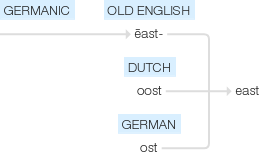East
Old English ēast-, of Germanic origin; related to Dutch oost and German ost, from an Indo-European root shared by Latin aurora, Greek auōs ‘dawn’.
wiktionary
From Middle English est, from Old English ēast, from Proto-Germanic *austrą, from Proto-Indo-European *h₂ews-.
Compare West Frisian east, Dutch oost, German Ost, Norwegian Nynorsk aust, Swedish öst.
etymonline
east
Old English east, eastan (adj., adv.) "east, easterly, eastward;" easte (n.), from Proto-Germanic *aust- "east," literally "toward the sunrise" (source also of Old Frisian ast "east," aster "eastward," Dutch oost Old Saxon ost, Old High German ostan, German Ost, Old Norse austr "from the east"), from PIE root *aus- (1) "to shine," especially of the dawn. The east is the direction in which dawn breaks. For theory of shift in the geographical sense in Latin, see austral.
As one of the four cardinal points of the compass, from c. 1200. Meaning "the eastern part of the world" (from Europe) is from c. 1300. Cold War use of East for "communist states" first recorded 1951. French est, Spanish este are borrowings from Middle English, originally nautical. The east wind in Biblical Palestine was scorching and destructive (as in Ezekiel xvii.10); in New England it is bleak, wet, unhealthful. East End of London so called by 1846; East Side of Manhattan so called from 1871; East Indies (India and Southeast Asia) so called 1590s to distinguish them from the West Indies.
